
 Your current location >> Press Release
Your current location >> Press Release
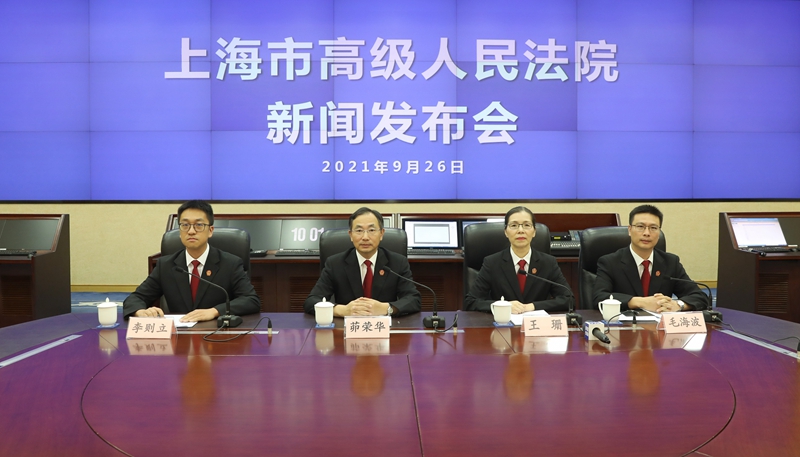
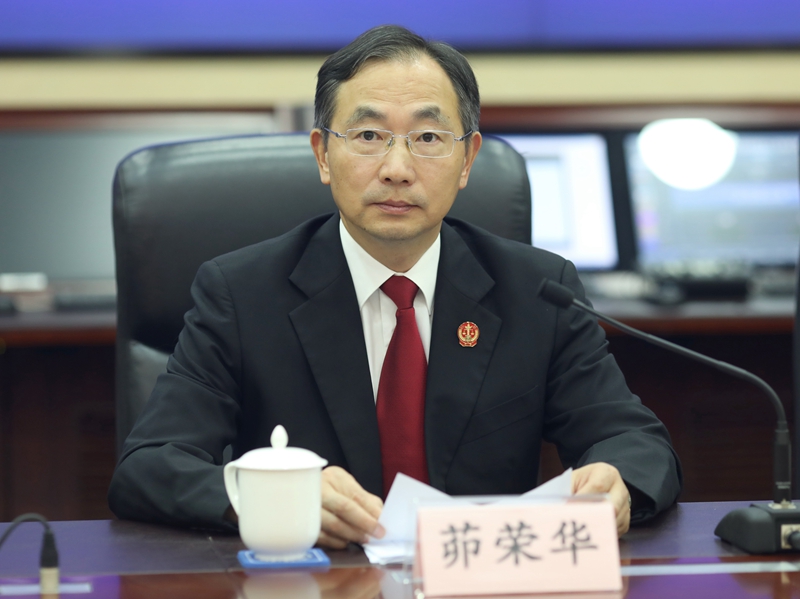
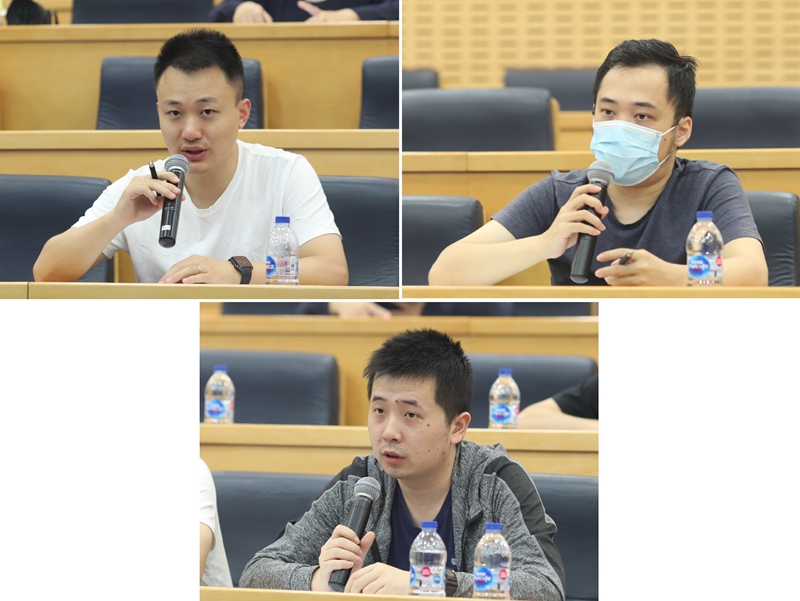
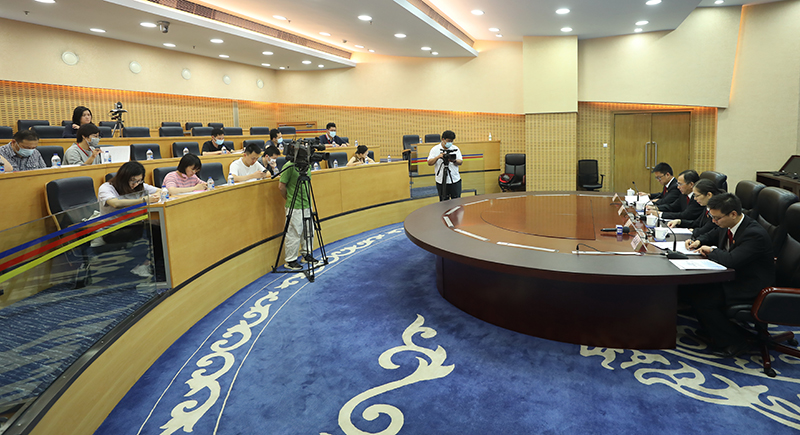
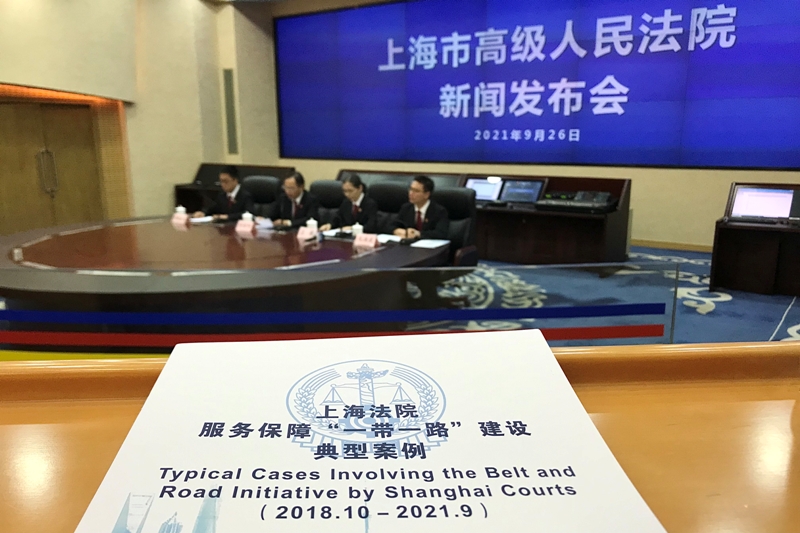
On September 26, 2021, the Shanghai High People’s Court (SHPC) held a press conference to release the Model Cases Handled by Courts in Shanghai to Serve and Guarantee the Belt and Road Initiative (2018.10-2021.9), which was the second time that the SHPC has ever released such cases. Mao Ronghua, deputy secretary of the Party Leadership Group and vice president of the SHPC, Wang Shan, president of the Maritime Civil and Commercial Tribunal of the SHPC, and Mao Haibo, vice president of the Commercial Tribunal of the SHPC, attended the press conference. The SHPC briefed on the background of and related information about the model cases, and answered reporters’ questions on the ascertainment of extraterritorial law and arbitration involving foreign parties. Li Zeli, director of the Rule of Law Publicity Department and spokesperson of the SHPC, presided over the press conference. This was the third press conference on promoting a law-based business environment by courts in Shanghai.
At the press conference, the SHPC issued model cases to convey the guidance of judicial rules. Three years ago, the SHPC issued the first batch of model cases concerning the Belt and Road Initiative (BRI). With the development of the BRI over the past three years, courts in Shanghai have also encountered more model cases which reflect that the BRI has entered a new stage. The SHPC selected eight typical cases and released them altogether, with a view to conveying the guidance of judicial rules to society and creating a good legal environment for the high-quality development of the BRI.
The eight cases announced at the press conference cover multiple aspects of the BRI, including ownership confirmation, sales contracts, copyright infringement, unfair competition, liability for pollution and damage of the ship, suspension of payment under the guarantee, application for confirmation of the validity of the arbitration agreement, and recognition and enforcement of judgment made by a foreign court. When handling those cases, courts in Shanghai made clear legal responses to difficult and complex issues and offered positive policy feedback on the judicial demands for the high-quality joint development of the BRI. That has reflected the common value orientation of supporting arbitration involving foreign parties, respecting international rules, fulfilling international obligations, and improving the business environment, and the principles of mutual respect, equality and reciprocity, and win-win cooperation when engaging with countries, enterprises, and individuals along the Belt and Road, showing how extensively and profoundly that the people’s courts have strengthened their efforts in promoting the BRI according to law.
Building a diversified resolution mechanism for international commercial disputes. As an internationally accepted way to resolve economic, trade, and investment disputes and an important approach to diversified dispute resolution, arbitration plays an indispensable role in handling international commercial disputes, improving the country’s business environment, and advancing the development of international rule of law. It is also an important way to make the BRI more inclusive and reciprocal.
In recent years, courts in Shanghai have expanded channels and strengthened inter-organizational collaboration to support arbitration involving foreign parties, and promoted arbitration to play an increasingly important role in facilitating the legal environment under the BRI. In 2019, the Shanghai Pudong New Area People’s Court set up a studio that deals with the litigation, mediation, and arbitration of commercial disputes involving foreign parties. Its court in the Pilot Free Trade Zone also signed a memorandum of cooperation with universities and 14 organizations in arbitration, mediation, ascertainment of foreign laws, translation, and notarization to promote one-stop resolution of commercial disputes involving foreign parties. The Shanghai Maritime Court has deepened the entrusted mediation mechanism with maritime arbitration institutions and economic and trade mediation organizations, and established in the litigation service center a dispute resolution platform that effectively combines litigation, arbitration, and mediation. In 2020, it explored a new approach to settling international disputes by working with the Shanghai Commercial Mediation Center to enable foreign mediators to successfully resolve a cross-border dispute. The Shanghai Intellectual Property Court has worked with the WIPO Arbitration and Mediation Shanghai Service to resolve a number of intellectual property disputes involving foreign parties through mediation.
Among the model cases released, there is the case of Daesung Industrial Gases Co., Ltd. et.al v. Praxair (China) Investment Co., Ltd. over application for confirmation of the validity of an arbitration agreement. It is the first case that has ever been handled in Shanghai where it is agreed in the contract with a foreign element that the foreign arbitration agency of the third party shall arbitrate in Shanghai. The court made a supporting ruling, which marks a new step towards international arbitration of disputes over commercial contracts with foreign elements in China.
Expanding the channels for ascertainment of foreign laws and improving the ability to apply them. One great challenge in handling the BRI-related cases is that the court has difficulty verifying the facts and evidence regarding countries along the Belt and Road and ascertaining the legal systems of various countries as they differ from country to country. To address the problem, courts in Shanghai fully respect the right of the parties concerned to choose the applicable law, and integrate the resources of various sectors to expand the channels for the ascertainment of foreign laws and improve the ability to apply them.
In 2014, the SHPC signed with the Center for Proof of Foreign Law of East China University of Political Science and Law (ECUPL) a cooperation agreement, under which courts in Shanghai entrust the center to ascertain extraterritorial laws and regulations. In 2020, the Shanghai Maritime Court signed with ECUPL and Shanghai Maritime University a special cooperation agreement for ascertainment of foreign laws, developed a foreign law search platform covering the maritime laws of major shipping countries in the world, formulated rules for collective entrusted ascertainment of foreign laws, and identified the entrustment process, handling of procedures, and time limits for ascertainment, etc.. A number of cases have been handled smoothly due to successful ascertainment of the laws of countries like Mexico, Greece, and Brazil. For example, in the case of China Merchants Logistics Holding Shanghai Fengxian Co., Ltd. v. Winterthur Gas & Diesel Ltd. et. al over confirmation of ownership, the court respected the autonomy of the parties’ will and ascertained the applicable laws of different countries based on the agreement made by the parties and the nature of different legal relationships. Through an accurate judgment on the cases, the court has protected in accordance with the law the legitimate rights and interests of the parties from different countries on an equal basis.
Going forward, the SHPC will continue to give full play to the demonstration effect of these cases, encourage and guide the courts at all levels in Shanghai to do better in the relevant areas, enhance the courts’ sense of responsibility and judicial capability in serving and guaranteeing the BRI, and build a good legal environment for the high-quality development of the BRI
![]() 上海法院服务保障“一带一路”建设典型案例(2018.10-2021.9).pdf
上海法院服务保障“一带一路”建设典型案例(2018.10-2021.9).pdf
